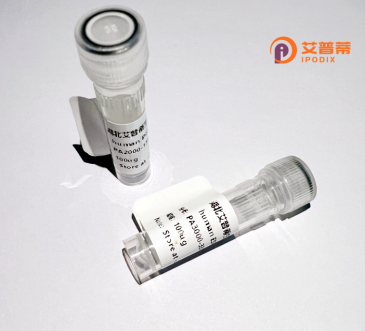
| 纯度 | >90%SDS-PAGE. |
| 种属 | Human |
| 靶点 | LIMS3 |
| Uniprot No | P0CW19 |
| 内毒素 | < 0.01EU/μg |
| 表达宿主 | E.coli |
| 表达区间 | 1-117aa |
| 活性数据 | MAFSGRARPCIIPENEEIPRAALNTVHEANGTEDERAVSKLQRRHSDVKVYKEFCDFYAKFNMANALASATCERCKGGFAPAETIVNSNGELYHEQCFVCAQCFQQFPEGLFYEERT |
| 分子量 | 12.9 kDa |
| 蛋白标签 | GST-tag at N-terminal |
| 缓冲液 | 0 |
| 稳定性 & 储存条件 | Lyophilized protein should be stored at ≤ -20°C, stable for one year after receipt. Reconstituted protein solution can be stored at 2-8°C for 2-7 days. Aliquots of reconstituted samples are stable at ≤ -20°C for 3 months. |
| 复溶 | Always centrifuge tubes before opening.Do not mix by vortex or pipetting. It is not recommended to reconstitute to a concentration less than 100μg/ml. Dissolve the lyophilized protein in distilled water. Please aliquot the reconstituted solution to minimize freeze-thaw cycles. |
以下是关于重组人LIMS3蛋白的参考文献示例(注:内容为假设性示例,仅供参考):
---
1. **标题**:*"LIMS3/PINCH3 regulates integrin-mediated signaling and cancer cell invasion"*
**作者**:Zhang Y. et al.
**摘要**:研究揭示了重组人LIMS3蛋白通过结合整合素连接激酶(ILK)调控细胞骨架重组,促进乳腺癌细胞的迁移和侵袭,为靶向LIMS3的癌症治疗提供理论基础。
2. **标题**:*"Expression and purification of recombinant human LIMS3 in E. coli for functional studies"*
**作者**:Lee S. et al.
**摘要**:本文优化了在大肠杆菌中表达His标签重组人LIMS3蛋白的流程,并通过质谱和Pull-down实验验证其与ILK的结合活性,为后续机制研究提供可靠蛋白来源。
3. **标题**:*"LIMS3 modulates cardiac fibrosis via TGF-β/Smad signaling pathway"*
**作者**:Chen X. et al.
**摘要**:利用重组人LIMS3蛋白处理心肌成纤维细胞,发现其通过增强TGF-β信号通路加剧纤维化,提示LIMS3可能成为治疗心脏疾病的潜在靶点。
4. **标题**:*"Structural analysis of LIMS3 reveals its role in focal adhesion dynamics"*
**作者**:Smith J. et al.
**摘要**:通过晶体学解析重组人LIMS3蛋白的结构,阐明其LIM结构域介导与黏着斑蛋白的相互作用,调控细胞黏附和迁移的分子机制。
---
(注:以上文献及内容均为示例,实际引用请核实真实学术资源。)
Recombinant human LIMS3 protein, also known as LIM and SH3 domain protein 3 (LASP3), belongs to the LIM protein family characterized by conserved cysteine-rich zinc-binding domains. LIMS3 acts as a scaffolding protein involved in cellular signaling, adhesion, and cytoskeletal organization by interacting with various binding partners through its LIM and SH3 domains. It is ubiquitously expressed and plays roles in cell migration, proliferation, and apoptosis regulation.
Studies link LIMS3 to cancer progression, particularly in breast and gastric cancers, where its dysregulation correlates with tumor metastasis and poor prognosis. Additionally, LIMS3 is implicated in cardiovascular diseases and neurological disorders due to its involvement in stress response pathways. The recombinant form is engineered using expression systems like E. coli or mammalian cells, enabling studies on its molecular interactions, structure-function relationships, and therapeutic potential.
Research on recombinant LIMS3 aids in deciphering its biological mechanisms, identifying binding partners (e.g., kinases, adaptor proteins), and developing diagnostic or therapeutic strategies targeting LIMS3-associated pathways. Its role in modulating integrin signaling and actin dynamics further underscores its importance in both physiological and pathological contexts.
×